#free bheem
Text
Monkeying Around with Mom’s Paint 🐵 Mighty Little Bheem | Netflix Jr
Monkeying Around with Mom’s Paint 🐵 Mighty Little Bheem | Netflix Jr
Bheem catches a sneaky monkey playing with Mom’s paint! The cartoon kid tries to stop the tricky paint thief monkey, but they both end up getting paint everywhere— even on mom’s painting! Mighty Little Bheem is now streaming on Netflix!
SUBSCRIBE: http://bit.ly/NetflixJrSubscribe
About Netflix Jr.:
Welcome to the official Netflix Jr. channel! Where kids can learn, sing and play with their…
View On WordPress
#baby Bheem#bheem#bheem 2022#bheem cartoon#cartoon#Chhota Bheem#fast baby#free bheem#Kalia#kids cartoon#kindergarten#mighty little bheem 2022#Mighty Little Bheem Season 2#mlb#Netflix#netflix family#Netflix Jr#netflix junior#netflix kids#Netflix Mighty Little Bheem#new Bheem#preschool#preschool learning#preschool videos#strong baby#super strength#toddler#Vijay#छोटा भीम#भीम
0 notes
Text
RamBheem – "You and I" (Fire and Water)
on Youtube here
#RRR#rambheem#rrr movie#bheem rrr#ram rrr#Ram Charan#N.T. Rama Rao Jr.#if you enjoy this please feel free to like it on youtube to support it because no one's gonna watch it on there lol#komaram bheem#alluri sitarama raju#RRR video#RRR edit#RRR fanart#char makes videos
64 notes
·
View notes
Text
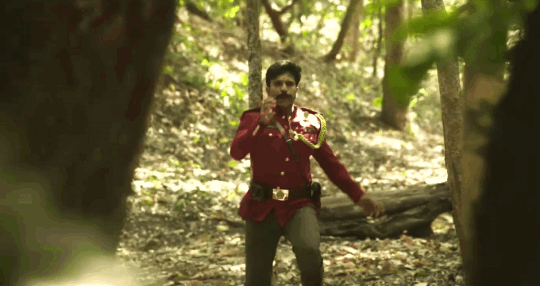
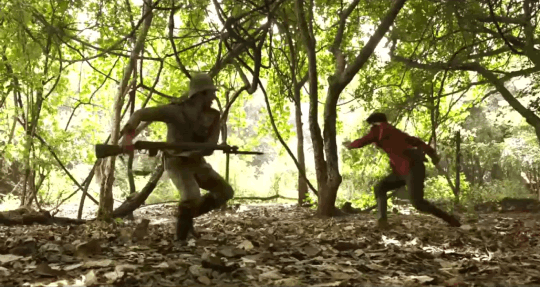
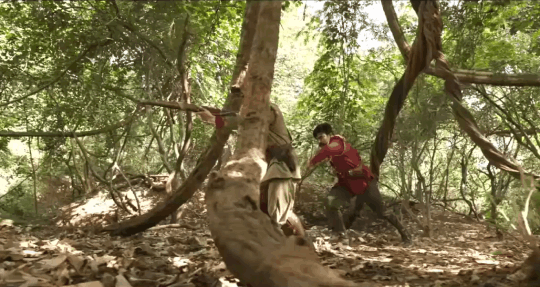
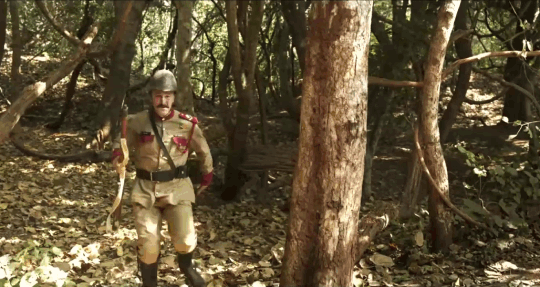
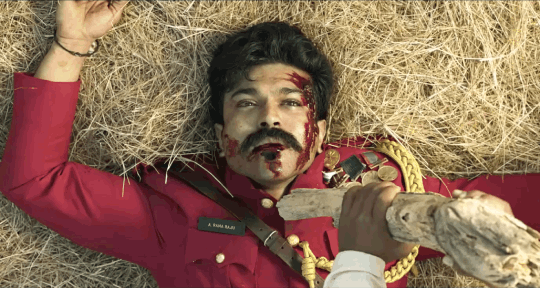
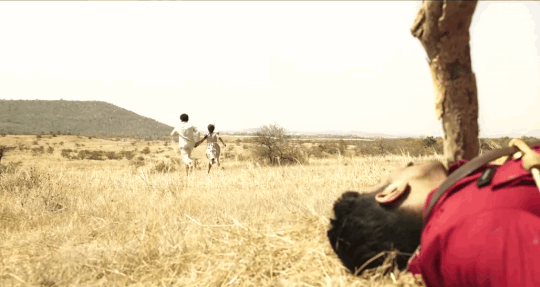
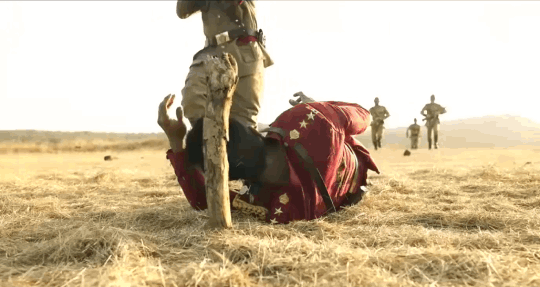
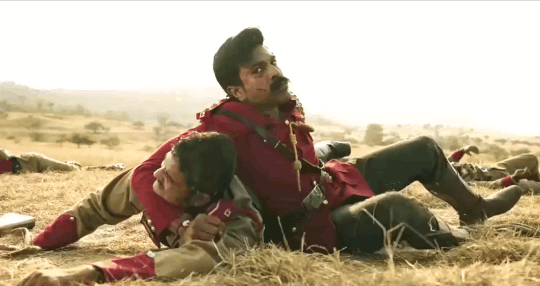
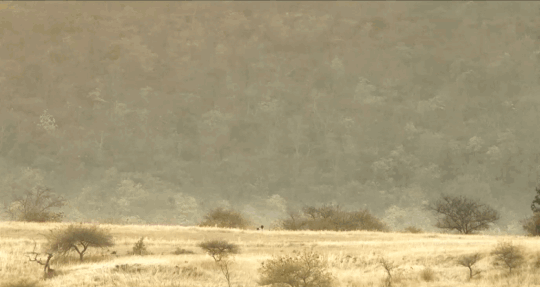
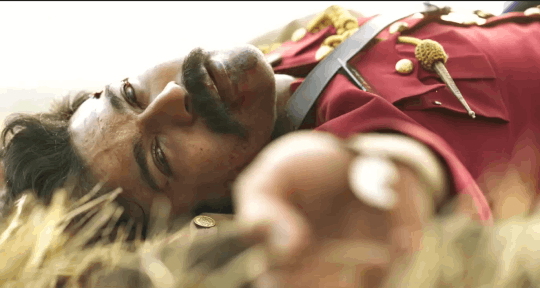
-You've worked so hard. Will you give it all up [to free Bheem]? Will you give up fifteen years of work?
-I'll do it for another fifteen years. But I won't sacrifice Bheem for my goal.
-Think first. It's very dangerous. You might die.
-I'll die with pride.
#RRR#tollywood#rambheem#and then ram doesn't die because gay people can survive anything.#it's funny bc in many other stories. this would be it. his last stand his dramatic death while bheem and malli are free#but rajamouli said No. he's alive. don't worry about it. now time for rescue and reunion and battle.#adventures in gifmaking
92 notes
·
View notes
Photo

I just had to get this out of my system huhu
My cute bois 🐯 🌊 🔥 🏇
#RRR#chibi#alluri sitarama raju#komuram bheem#This movie has me on a chokehold#tryin' to read cases for law school but naatu naatu and dosti be ringing in my head#free me lol jk
115 notes
·
View notes
Text

#rrr#rrr film#rrr fandom#rrr movie#rrr dosti#rrr ram#rrr bheem#celebRRRation22#celebRRRation22 free for all
10 notes
·
View notes
Text
pogo acquired ! everyone cheer
#FINALLY got out of my aunts place to a hotel i feel SOOO free and the tv has pogo#and me and my brother r watching chotta bheem in hindi it’s incredible#we also have a bed that FITS everyone after the meeting i have at 10:30 i’m going to COLLAPSEEEE into that bed !!!!!!!#anyway. 3 days left i think. jetlags is still a thing but consider. warm bed. forever wanting to go home like take me back!!!!!! enough!!!!!
1 note
·
View note
Text
so funny to hear men support hijab ban claiming that it oppresses muslim women. taking their education away is a great way to liberate them. and are we really going to pretend you give a fuck about women bffr.
#same men who call women feminazi when they say they dont want to be killed for existing#bheem take care of them wont you#autopsy.#let’s say they were oppressed do you thinktheir families will let them pursue education?#the cycle of ‘being oppressed’ will js continue#if they attain education they will at least have a higher chance of freeing themselves from the so called shackles#religion //#india
10 notes
·
View notes
Text
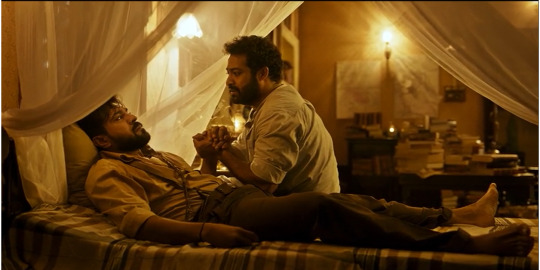
Bheem rescues Malli and returns to Ram's home to lay low, only to find the bed empty and Ram on the floor.
Ram is not healing from the menaag bite as he should be, a fever clings to him, and he, in turn, clings to Bheem.
#rrr movie#a. rama raju#k. bheem#my writing#rrr fanfic#alluri rama raju#komaram bheem#not ship but you are free to interpret how you please#shameless self promo#rrr fandom
1 note
·
View note
Text
MONKEY MAN REVIEW, WARNING: LONG POST
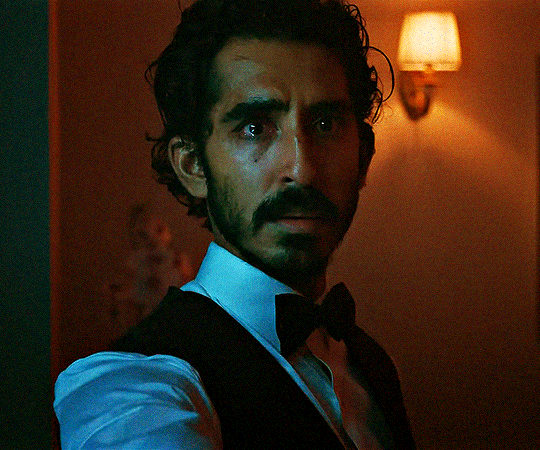
so…i just finished monkey man and now i will never recover.
dev patel you absolute gem, the genius of this movie and what it will do for desis who want to make their own mark in this world will never stop being talked about.
the religious references, the corruption within the systems meant to protect us, the devastation brought upon those viewed as lesser beings is shown within the movie beautifully. however, i have already seen, as expected, some who do not like the portrayal of india within the movie.
despite the good story, the portrayal of india is exactly how hollywood has always presented it: slums filled with poverty, dirt and despair. i am also tired of the west only showing india in this close-minded, ignorant way. as an nri, i know that even i have been influenced by the media to view india in a particular light. but i shall try to look at this from both sides.
one thing a person must remember that the things shown in the movie are unfortunately true. even movie creators in india have highlighted the way police are bribed by powerful people into doing their bidding and neglecting those they are meant to serve, the way religious leaders forget the entire meaning of their religion and use it to propel their fame and power, the slums where the poor have to beg to survive.
however, i do not agree with the way the west tends to almost always fetishize india into this almost dystopian land where it’s kill or be killed for the viewing pleasure of people who know nothing about our land. we cannot afford to be portrayed in a negative light as there is already little to no hollywood representation of south asians where india is shown to be a young, thriving nation bursting with potential. the last time hollywood acknowledged a movie in which india was shown positively was rrr (i still believe some of the hype over the movie was because it showed indians, therefore india, as beautiful and unafraid to be herself in the face of her captors. think back to all the shots of bheem in the forest, being one with nature and ram’s utter devotion to freeing his motherland instead of wallowing in its flaws). even then it was only once, and now we have yet again another movie where india is shown like this poor, uneducated, morally corrupt nation.
except…dev patel is also celebrating his nation, is he not?
i am not saying that india must always be shown as an unhygienic, primitive land filled with violent people and constant suffering. what i am saying is that while dev patel is showing the country in this specific light, he is also showing how its people are fighting back.
kid and his mother, two devoted believers of hinduism, stand up against the ones who use it to only further their own gains. the trans community, the hijra community, stand together in their own nation as worshippers of shivashakti even though their own brothers and sisters attack them, sometimes claiming trans people are a “western invention.” these are indians who value the lessons and beliefs imparted by their nation. the tabla is used to fuel kid’s desire to get revenge for his mother’s murder, it is used to tell stories and make people laugh. the ramayana is an allusion used to communicate that light triumphs over darkness no matter how difficult it may seem.
india is a land filled with complexities and contradictions. not one portrayal of india will ever, ever be truly accurate or correct. not the good ones, not the bad ones.
dev patel is just showing us the story of one, singular man. he does not speak for all of us, he is not claiming to always want to show india in a “backwards” way. he is simply telling the story of how a young man is fighting against the systems of oppression by using his mother’s faith in hanuman, the gods, as guidance to rid mother india of those who manipulate her rich culture and beliefs to pollute it. and if he has to portray india in a negative way to share this story then so be it, it is his freedom to do so. there is an entire generation, including myself, ready to look at dev patel and what he has done and say, “we can make more stories of our own,” and show india in a way that truly reflects her diverse, unique nature, one that rids this fetish of india being shown as unclean and impure.
let us celebrate that dev patel is paving the way for desis to have the power to tell our own stories in whichever way we want to.
anyway.
dev patel covered in blood was absolutely stunning, 10/10
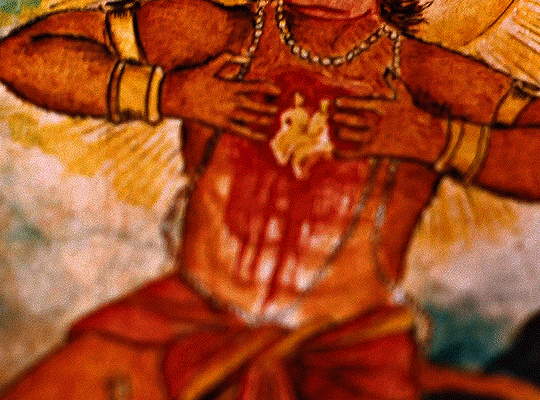
24 notes
·
View notes
Note
A headcanon on Abhimanyu and Uttara, if Abhimanyu had somehow survived the war.
Hi anon,
I don't think THIS is what you have asked for, but you did ask me, so.
Enjoy!
(It kind of reminds me of something @avani008 once wrote.)
Drona, the Kaurava Commander on the 13th day of the bloody war, is swept over by a sudden wave of compassion and orders his army to free a badly-wounded Abhimanyu. It is practically sundown anyway, and the Pandava Army has suffered heavy casualties.
The boy, on the cusp of death, fights a second battle for life back in his camp. His father is greeted by a faint smile from him, and the violent storm within Arjun calms for a moment.
Kunti's youngest takes no pledge that night.
Duryodhan, however, is furious, more so than on any previous night. His son has perished, while Arjun's lives on. And so, Drona is relieved of his duties and sent back to Hastinapur, while Karna takes charge of the Kaurava Army.
The prophecy regarding Dhrishtadyumna is not fulfilled on this battlefield.
No other threat looms over Arjun on the 14th day, and Karna, given sharp instructions by his friend, wastes no time before releasing Indra's weapon onto his brother.
Krishna knows he could have kept them apart no longer, but it isn't enough to console him. He grieves in chilling silence, arousing in the people around him a fear the world is unfamiliar with.
He had told his Parth he wouldn't use a weapon in this war, so he does not. Instead, he takes Arjun's body to their camp.
Bheem, on the other hand, has made no vows of nonviolence. He causes a chaos not yet seen in the war.
But grief too great can kill you. And it gets him killed.
Yudhishtir is more distraught than he has ever been, yet his speech is soft. He bargains his freedom for the lives of the remaining Pandava warriors.
Nakul and Sahdev join their jesht in this bargain.
("They will be prisoners, not slaves... we'll spare them no more attention," Duryodhan declares.)
The Pandavas' vows are not fulfilled on this battlefield.
Panchal and Dwarka offer to provide shelter and protection for Draupadi, Subhadra, and their children. The former empress, whose hair shall never be bound again, accepts a promise of shelter from Bhanumati, instead. She hopes her presence in Hastinapur will help keep three of her husbands alive.
That it won't let Hastinapur forgive itself.
She sends her sons to Panchal. The Kuru capital is not a safe place for a son of Yudhishtir.
Subhadra stays with Draupadi, and Abhimanyu ignores proper recovery to split his time between Matsya (a land now void of princes) and in the service of his mothers.
Uttara is in constant awe of how the two women, bereft of so much in life, manage to smile at her and spoil her in the final months of her pregnancy.
But she does not fail to notice how Subhadra's breath catches when she caresses Abhimanyu's cheek, how a look of devastating confusion mars Draupadi's face every morning when she has to decide how much jewelry to wear.
How much color to wear.
Other men do not come to their chambers often. Sometimes Vidur visits to give them the encouragement he can muster.
Gandhari's is a common presence for them. Kunti spends most of her time in the dungeons, bestowing any comfort she can onto her surviving sons.
For weeks, Drona and Vidur try to convince Yudhishtir to welcome a sentence of house arrest in lieu of this one. Yudhishtir refuses - he will not dishonor those who have died for him.
Even at the peak of her pregnancy, Uttara sends gifts for her uncles with Draupadi. Small things, like the flowers she has been told they loved, to remind them of life's simple beauties. After all, she knows how it feels to lose brothers.
Draupadi always hugs her tightly in response, without a word. Agni's daughter speaks less than she used to.
Uttara doesn't know how it feels to lose a husband. She doesn't want to know.
She misses Arjun, too, but how can she explain that to anyone? To his son? His widows? His mother?
In her silent torment, she forbids herself from wearing ornaments adorned with bells of any sort.
The quiet that results rings loudly in Abhimanyu's ears.
How can he help her? He hides his skin from his own eyes because he cannot forget how his wounds hadn't allowed him to see off his father's body. (Srutakarman has refused to give him details.)
Abhi studies Subhadra carefully when he is with her, desperate to protect her as well. She is composed and tired at the same time; kind to them, but distant from her reflection. As if she has buried anger deep within her.
Without his father, without his mighty uncle, Abhimanyu's family feels like a house without walls. Exposed and ready to collapse...
But somehow, it holds itself together.
He's reassured of how when a scroll from his mama ignites divine sparks in Draupadi's sad eyes, when messages from his brothers make Subhadra's lips curve up into gentle smiles.
And when his uncles share stories about their childhood, filling those dark cells with a bit of warmth.
Just over three months after the war, Uttara gives birth to a healthy baby boy. And, before her mothers can agree on a suitable name for the child, they receive a flood of visitors:
Draupadi's sons arrive to meet their nephew, Krishna and Balram bear gifts from Dwarka, and even some of Karna's sons bring their mother's blessings from Anga (this surprises Uttara the most).
Sudeshna rubs her daughter's hair fondly, relaying Virat's blessings for the baby. For a brief time, Uttara isn't so weighed down by what they have lost.
But then, after a few days of pleasant conversations and attempted normalcy, Sutasom breaks apart in Draupadi's arms. He questions his mother about their uncertain future and begs her to undo the 14th day, so that he may swap his fate with his father's.
Drupad is being turned into a puppet in his own kingdom, he says.
Karna's sons are gone now, and Hastinapur's palace has grown bored of its new resident. It is to this intimate assembly of Panchal, Dwarka, and Matsya's ties to the Pandavas that Krishna finally speaks again of politics.
He speaks under his breath, with a hollow and mirthless tone:
(His voice makes Abhimanyu miss the whispers of death.)
"Duryodhan may be a good king, but an emperor has to take responsibility for more than his own city. No one is immune to greed and corruption, not even Dwarka. His allies mustn't..."
"We need to choose a name by tomorrow," Draupadi cuts in, her solemn gaze fixed on the baby in Subhadra's arms. This is the first time she has ever interrupted her sakha.
She shifts her eyes to Krishna and blinks, and the son of Subhadra could swear he hears her say, "I won't forget."
-----
The group takes the baby to Bhishma, who still lies on the bed of arrows, his wishes incomplete and his body embraced by Arjun's memories.
"Parikshit," the aged man suggests when asked for a name, "because his... our future will surely test him."
Krishna nods in agreement, and Uttara cannot remember where she has heard this name.
#Mahabharat#a.#this is surbhi and welcome to an all-new episode of How Can We Make This Hurt?#we are going to overlook (ulupi's mani and) the fact that krishna probably wouldn't let it happen ok#Abhimanyu
112 notes
·
View notes
Text
Mighty Little Bheem FULL EPISODES 5-8 💪 Season 1 Compilation 💪 Netflix Jr
Mighty Little Bheem FULL EPISODES 5-8 💪 Season 1 Compilation 💪 Netflix Jr
4 FULL Mighty Little Bheem cartoon episodes! Join baby Bheem (a younger Chhota Bheem), frenemy Vijay, and all the other friends we make along the way for some extraordinary adventures. Mighty Little Bheem is now streaming on Netflix!
Episode 5: Mighty Hiccups
Episode 6: Bheem’s Blanket
Episode 7: Mighty Muscles
Episode 8: A Babysitter’s Nightmare
SUBSCRIBE: http://bit.ly/NetflixJrSubscribe
About…
View On WordPress
#A Babysitter’s Nightmare#baby Bheem#bheem#bheem 2021#bheem animals#bheem cartoon#Bheem full episode#Bheem’s Blanket#cartoon#Chhota Bheem#fast baby#free bheem full episode#Kalia#kids cartoon#Mighty Hiccups#mighty little bheem#mighty little bheem 2021#Mighty Little Bheem full episode#Mighty Muscles#mlb#Netflix Jr#Netflix Mighty Little Bheem#preschool#strong baby#super strength#Vijay#छोटा भीम#भीम#माइटी लिटिल भीम#माइटी लिटिल भीम पूरा एपिसोड
0 notes
Text
The callbacks and foreshadowing in RRR man
The bridge scene where Ram and Bheem start by holding the flag of the nation and a child in danger respectively before exchanging them midair, symbolizing how through their original goals- Ram defending his countrymen; Bheem coming to rescue a little girl- they end up switching their objectives to help one another

Ram giving up the win during the dance battle between him and Bheem so he'd look good in front of his "crush", foreshadowing how he ends up sacrificing his chance of getting the weapons his village needs for revolution to free Bheem and Malli





This goofy ass bro move in their cute friendship montage coming back as their ultimate combo fusion form (I adore them)


Man I just love this movie
195 notes
·
View notes
Text
On Bheem acting as a "mediator" between Ram and Seetha
[Disclaimer: this is not about shipping wars, it's just an analysis because I find the dynamic interesting. Whether you ship rambheem or ramseetha or both or neither is irrelevant for this, and beside the point.]
Click here to read this post on Ao3
It always drew my attention that most of Ram and Seetha's interactions seem to be mediated by Bheem. That is, have him as a middle man; there is the obvious part where Bheem brings Ram back to Seetha, but it's more than that. Ram also only writes to Seetha because of Bheem. When they first reunite, it is Bheem who joins their hands together. Even during Etthara Jenda, there is no moment with just Ram and Seetha; Bheem is always there. In fact, there is a brief moment with only Bheem and Seetha, but none with only Ram and Seetha. It seems that Ram and Seetha only ever meet through Bheem, as if he's the thread connecting them.
I thought that was interesting and I think I'd like to expand a bit on that. At first I thought it was just because the movie is obviously focused on Bheem and Ram and their relationship and the other characters are... Just not that explored outside of their relationship to the core characters and/or the plot. But I think there is also some symbolism there that is worth exploring.
When Ram leaves Seetha, he tells her that a part of him will always be with her. I'm working with the English translation here, because unfortunately I don't speak Telugu, but I did check the Portuguese, Spanish, and Italian translations and they all pretty much translate the same, so I'm going to assume that the translation here is accurate and communicates everything it's supposed to communicate. That means that leaving Seetha is also leaving that part of him behind. I mean, the symbolism is pretty obvious here. He takes his pendant, which was a single circle, and breaks it in two. One part he takes with him, another he leaves with her. From that moment on, Ram is incomplete.
And I think that the part that he left with her isn't just, generically speaking, half of him; I think the part that he left with her was his own humanity.
Here's why.
When Ram leaves his village, he takes two things with him: his grief and his sense of duty. That is all he has in Delhi. Well, other than his uncle, but his uncle was already in Delhi before Ram went on his mission, so I don't think he counts as something Ram "takes with him". I really doubt Ram would have asked Venkateswarulu to come if he hadn't already been in the police force before Ram was.
When we first meet Ram, the only emotion he allows himself is anger, and even then, only in private where no one can hear him. Even Venkateswarulu seems unable to really reach him. Ram is fueled exclusively by his rage, his need to do something to alleviate his grief, and his promise. He has no meaningful connections with anyone, he doesn't allow himself his feelings, and he needs to keep everything that makes him himself locked away so he doesn't blow his cover. Ram is living in nearly complete isolation and completely detached from his own feelings; he doesn't even allow himself his grief, because it would get in the way of his mission. It serves as fuel and a reminder of what he has to do, but it's not something he is actually allowing himself to feel in full.
So what is missing? He is missing his sense of community. His history, because Seetha has been a part of his life since forever, and she is also the embodiment of his connection to his village as a whole. His love and his joy, because everything that was meaningful and dear to him he left behind with her. And as time goes by... More and more, he leaves his ideals, too. By the time we meet Ram, he isn't really fueled by his need to free the land; he is fueled by his grief. When he falters, he doesn't think of the free world him and his father envisioned; he thinks of the despair he felt as he watched him die. He is doing this because he is, in a way, trying to provide meaning to his family's death, trying to save them symbolically, trying to alleviate his survivor's guilt and fulfill his promise. He gets so fixated on the weapons he forgets they're a mean and not an end. Therefore, his beliefs ended up staying with Seetha as well.
So... Community, history, love, and beliefs. Combined, I'd say that's pretty much everything that makes us human. Of course, pain is part of the human experience as well, but without those... There isn't much else left for a person.
And look, I'm not saying that Seetha makes him good or that she exists to take care of him and bring him back to himself, I want to make that clear. This isn't about anything in particular Seetha does or should do to or for him; this is about the fact that Seetha was the last good thing Ram allowed himself, and therefore his distance from her is also his distance from his own needs. The further he is from Seetha, the further he is from himself and his humanity.
I think there are at least two scenes that add credibility to that thesis: the first and most obvious one is when he is torturing Lacchu and his wristband snaps. When Ram first gets to the point of no return, when he is doing the most inhuman thing you could conceive, and he's doing it with gusto, too, because he's angry, he completely loses his connection to her. And then it immediately cuts to Seetha not only waiting for Ram, but actively asking a kid to scout and check if he is there. She is unable to find him, unable to connect again; and then it is made pretty clear that Ram has strayed too far from her. It is immediately after that moment that we learn he hasn't written to her in all these years, and one of the villagers even asks her if Ram remembers her at all. I also think it's interesting that it's the rest of the village that voices the concern for Ram and the sense of betrayal, and not Seetha; not to mention that they went to her to ask what is happening with Ram. This further cements Seetha as a representation of his connection to his own past and people: it is through her that they seek him out, and therefore, she is the link between them.
(Again, I'm not saying that she is literally the one doing the work of keeping them together; I'm saying that the movie has her, symbolically, embody the entire village. So when we are reminded of his distance from her, we are also reminded of his distance from them, and therefore, from himself)
The second scene is when he, finally, after all these years, writes to her. This is the first time in the movie where Ram actually voices his thoughts, instead of just screaming and drowning in his own memories. We know what Ram is feeling and thinking, but he never allows himself to acknowledge it. When he does, he does it through talking to Seetha; because she is the one who keeps the part of him that allows himself to feel, the part that is idealistic and that is doing this for love for the motherland rather than hatred for the British. The part that remembers what he is really fighting for.
And not only does he seek himself in Seetha, he is also only able to connect to Seetha when he stops denying himself. I actually think that's the most important part. He has spent four years isolated from her, without any sort of communication; he lost his way to her because he locked out his own humanity to be able to survive being a double agent. It is only when he unlocks it, really allows himself to feel and think and question, that he is able to find his way back to her.
And what allows him to unlock his humanity and search for her in the first place?
Bheem.
That's where his mediation comes in.
Because Bheem was the first one to crack Ram's walls at the very least since he went to Delhi, but I'd risk saying that really it's the first time since he lost his family. He kept everyone at arm's length; he threw himself into his mission as a way to avoid actually processing his grief. Of course he still had his village and Seetha, but you don't just become this repressed and guilt driven out of nowhere. Even as he's saying goodbye to Seetha and the village, Ram doesn't once smile. We see his face tight and nearly blank, the same way it was when he was first introduced, fighting that mob. There is determination, but otherwise, he is completely closed off. And he is leaving alone.
And then he meets Akhtar, and this motherfucker becomes unrecognizable.
I've joked before that he must have pulled his cheek muscles after he met Akhtar, but it is seriously a jarring difference. He spends the entire Dosti montage grinning from ear to ear, save for the "don't eat with your left hand" moment and the parts where they aren't actually together. We have never seen him give even a tight lipped smile before, and suddenly the man can't stop laughing. We have never seen him express a clear emotion, and suddenly we have him not only emoting but also showing vulnerability. Even after the montage, Ram is frequently grinning at Bheem, and he is shown with his body language relaxed when we've only really ever seen him tense. In fact, not only tense, but so tense he is frequently shaking.
It's not even just the expression of positive emotions. Meeting Akhtar also gives us our first glimpse of who Ram truly is and what he actually believes. The best example of that is the events in Naatu Naatu. For the first time ever, Ram rises up against the British. Even if it's in a small way, it's an act of open defiance that we hadn't seen before. He taunts Jake, he mocks him, he openly laughs at him (which is also curious, considering that Bheem was the one that Jake hurt; but Bheem is largely ignoring Jake, while Ram is going out of his way to antagonize him). The part of Ram that is purely rational and mission driven would have thought it better not to draw attention; so when Ram chooses to take that risk and be defiant, he is also remembering what really matters to him: protecting his people and fighting for justice. And that takes the form of protecting Bheem.
Therefore, those parts of him that had been kept away suddenly come crashing back when he meets Bheem. Bheem helps him find his way back to himself without even trying, and if he is finding the way to himself, he is finding the way to Seetha. Not to mention that it is because of the fact that he couldn't live with betraying Bheem that he wrote to Seetha in the first place. Bheem helped him find the part of him that loves and rejoices and is driven by more than just rage again. So, when he turns his back on Bheem, he is also going back to denying himself his own humanity. But he can't actually do it this time; and so, when he finds himself unable to keep repressing himelf, he writes to Seetha.
Even before that, however, Ram's connection to Seetha is only shown to the audience through Bheem, and the link between his relationship with Bheem and his relationship with Seetha is shown from the very first time we learn about her.
We are first shown the pendant during the Dosti montage. Ram was wearing it before, of course, but the movie kind of went out of its way to hide it. In his introduction, he is straight up not wearing it. The first time he is shown with it is when he is destroying that poor punching bag, and he nearly immediately wraps his hands and wrist in tape that covers it:

[ID: Screencap of Ram punching the bag, where you can see his knuckles and wrist are wrapped in tape. End ID]
Then, in the "RRR" title page, they didn't include Ram's pendant in the drawing of their hands together, even though they kept Akhtar's wristband:
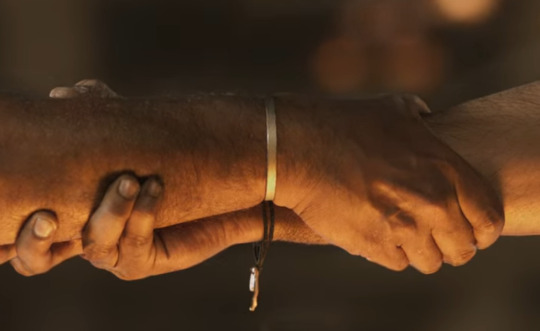

[ID: Screencaps of Ram and Bheem's joined hands when they meet; you can see that Ram is wearing his wristband. Then, when it transitions into the drawing, his wristband is no longer shown, but Bheem's is. End ID]
They're not always hiding it, and you can frequently see it on Ram's wrist if you know to look, but they don't draw attention to it and actively avoid accidentally drawing attention to it.
(But also, interestingly enough, it is first visible in the scene where Ram is talking to Venkateswarulu; and the scenes where it is most visible before Dosti are the ones where Ram is talking about killing governor Scott, and when he's helping Bheem save the child. I think this is a subtle way of hinting that this is who Ram truly is; even though he is pretending when he says that he's going to kill governor Scott, he is still closer to himself and his ideals than he was when he attacked that mob. And even more so when he helped Bheem do what they both are sworn to do: protect their people.)
Then, during the Dosti montage, they film it directly for the first time. We see Ram playing with it and acknowledging it, and we learn that it is significant to him. And then they won't stop filming it after that.
This isn't a coincidence; the pendant is the embodiment of his connection with Seetha, and, therefore, with his humanity, as previously stated. The fact that it is shown during Dosti, which is also when we first see Ram acting fully like himself, goes to show how much Bheem's friendship is helping bring Ram back. I mean, for starters, just sitting there fiddling with it and smiling is something I can't imagine pre-Bheem Ram doing. Nevermind the fact that he lets Bheem see it and doesn't even try to hide that moment of vulnerability from him.
After that, the pendant is used to highlight Ram's struggle with figuring out what he wants to do (which really means figuring out who he is) after he betrays Bheem. For example, when Ram grabs Bheem, we get a shot of him crying blood, and the blood falls right beside the pendant, in a shot that shows almost nothing but these two things:
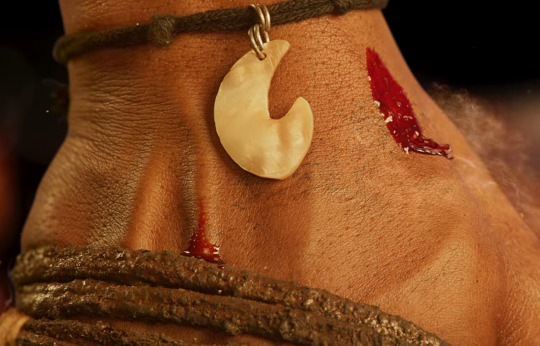
[ID: A drop of blood falling on Ram's hand, right next to the pendant. You can seee only Ram's wrist and a bit of the holy thread wrapped around his palm. End ID]
(Also, this time, the illustration of their hands does include the pendant)

[ID: The illustration of Ram's hand that immediately follows the previous shot. The pendant can be seen wrapped around his wrist and over his palm. End ID]
Further cementing the idea that the wristband represents the last of his connection to his humanity is the fact that, in the flogging scene, Ram is wearing it on his left hand.
In every other scene, it is on his right hand. That seems to be something they were very careful about. But throughout the flogging you can see that it is on the left. In fact, they even open the scene with a shot of it:
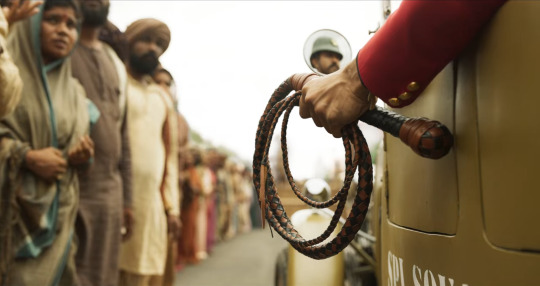
[ID: Ram driving to the square. He is holding a whip in his left hand, and the bracelet can be seen on his wrist. End ID]
Throughout the scene, it is hard to see the bracelet because of the uniform's long sleeves, but there are a few shots that confirm that it's on his left wrist:
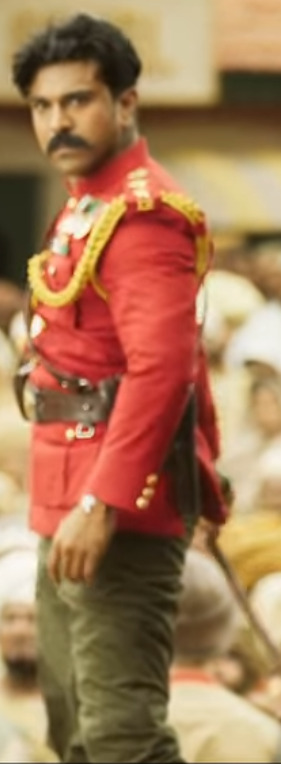
[ID: Ram with the whip on his right hand, pulling it back. His left hand is in front of his body and the bracelet is visible. End ID]
And at the end of the scene, we can see it clearly:

[ID: Ram cradling Bheem's bloody face. His left hand, on which you can see the pendant, is holding Bheem's chin. End ID]
It's too consistent to be an accident, especially considering how it never ends up misplaced in the left wrist in the other scenes. On top of that, the movie brings up the fact that the left hand is considered dirty (in the scenes where Bheem's fake mom and Ram's real mom tell their respective children not to eat with their left hand).
Disclaimer for this part: I'm neither Hindu nor Indian, so I looked up as much as I could on the right/left significance, because I believe people should make an effort to understand the implications that don't speak directly to their experiences, especially when it comes to culture and race. If anything I say is inaccurate or offensive, please let me know, and I'll edit it. If there's anything else I'm missing, feel free to add it as well. I also assume that the cultural associations with the right and left go beyond religious significance, since Akhtar's family is Muslim and not Hindu and they also enforce the "no eating with your left hand" rule. But Ram is Hindu, so I'm also using sources that talk about its significance in Hinduism. I don't mean to imply that the two are interchangeable by that.
I found many different significances associated with the right and left sides in Hinduism (right is male, left is female; right is submissive, left is contrary; right is yourself, left is your spouse), but the most important one seems to be that right is sacred and pure, and left is profane and dirty (because that one was mentioned in every paper I found, and it was usually the first to be brought up). Hence why it's important that you eat and give offerings with your right hand, and do "unhygienic" tasks with the left. This rule also applies to Islam, which explains why Akhtar's fake mother made the same comment. The fact that this aspect of the right/left duality is brought up in the text also implies that this is the most important one in this context.
So, if the left hand is dirty and profane, and the pendant is Ram's humanity, and the pendant is on Ram's left hand in this scene... I think what the movie is telling us is that in this moment, Ram is forsaking himself. He is going against everything that he truly is and believes, and his own feelings; he is even condemning himself, in a way, because this is the kind of thing that there should be no turning back from. In that moment he is the furthest he could be from everything that is holy, and good.
(Also, from a Watsonian perspective, we know that Ram has been taught that the left hand is dirty by his mom; if he chose to change the placement of the pendament in that moment, I think that speaks volumes on how he's feeling about himself. I also think it's possible that he did it because he couldn't stand to whip Bheem with the same hand that held his reminder of Seetha).
I also find the "right hand is yourself and left hand is your spouse" significance relevant here, although secondarily. I know Ram and Seetha are not married yet, so I'm not sure if Ram's left hand already "counts" as representing Seetha, but even if it doesn't, I think the fact that Ram is putting the embodiment of himself away from the hand that represents himself and on the wrist that is supposed to (at least eventually) represent Seetha goes to show that he truly left everything that matters about himself with her. His soul is no longer resting within himself because he turned his back on it. So, it is all with Seetha. If he had left half of his true self with her before, once he whips Bheem, he fully abandons himself. All that's left of the true him is in Seetha's memories.
This is, I think, further enforced by the fact that, although we get enough shots of Ram's left wrist to confirm that it's there, what the movie focuses on the most during that scene is not its presence on the left wrist, but its absence on the right one. Ram's right sleeve is always slightly pulled up in that scene, so we can see that the wristband is not there, like the movie is constantly calling to our attention that something is wrong with Ram. On the same vein, during Komaram Bheemudo, the framing very carefully hides his pendant in most shots. They go out of their way to leave it out of frame, even in the closeup shot of Ram wiping his tear (which he does with his left hand, where the wristband is at the time).
Here are some examples of both the framing and the sleeve being ridden up:

[ID: Ram picking up the spiked whip. The shot cuts right where his left wrist would begin, but shows most of his right arm. The sleeve is ridden up til nearly mid-arm, so you can clearly see that he's not wearing the wristband. End ID]

[ID: Ram first hitting Bheem with the spiked whip. His sleeve is still rolled up, and his wrist is in the foreground, without the wristband. His left hand is behind his body, out of frame. End ID]
The entire Komaram Bheemudo scene focuses on the lack of the wristband, aka the lack of Ram's own self in that moment. He is doing everything he is supposed to be fighting against, and betraying himself in the process. So the absence of him is felt even more acutely than the displacement itself.
Then, when Ram decides that he is going to save Bheem, the opposite happens: they go out of their way to keep the wristband within the frame. Even when Ram first shows up in that scene, it is framed in such a way that the part of him closest to the viewer is his right wrist.
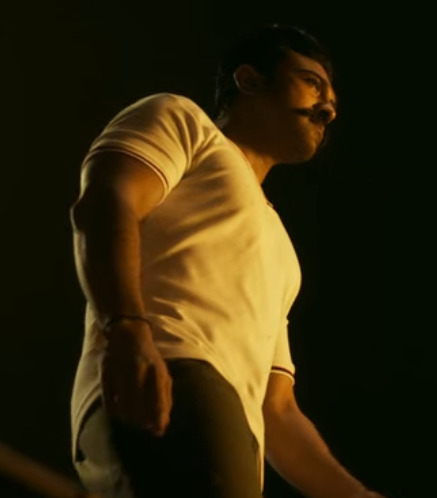
[ID: Ram walking into the scene where Bheem was flogged. It is shot from under him and to his right, so his right wrist is the thing closest to the camera. You can see the wristband on it. End ID]
Even when he is being filmed from the left, the wristband is still visible:
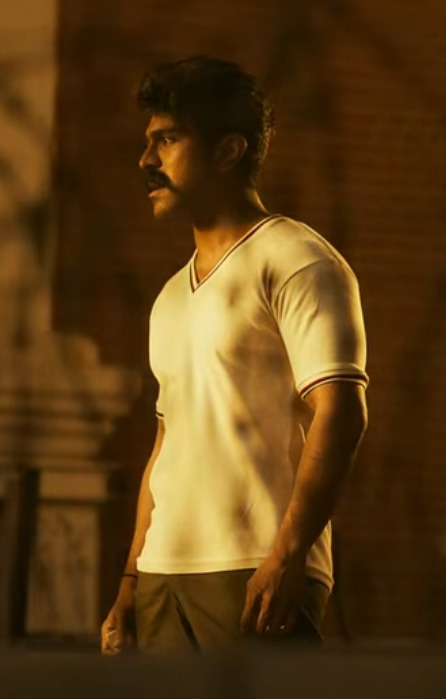
[ID: Ram being filmed from the left side as he talks to his uncle. He is shown from a 3/4 position, so we can see the wristband on his right wrist even as it is turned away from the camera. End ID]
And even when there are other objects obstructing part of him, the framing is such that you can always see it:
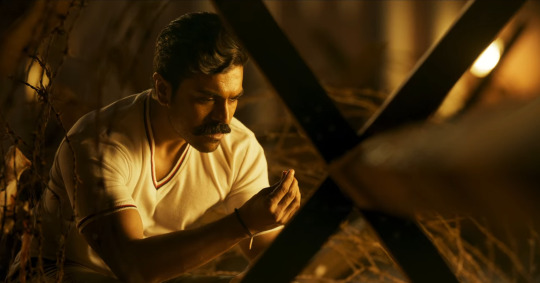
[ID: Ram looking at the blood on his hand. He is shown from within a circle of barbed wire. There is an X right beside him, but it is still framed in such a way that Ram's pendant is visible as he raises his hand to look at it. End ID]
In fact, during that scene, we get a closeup of the pendant for the first time since Ram betrayed Bheem:
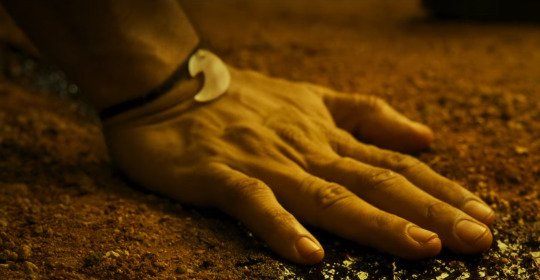
[ID: Ram touching the ground, which is wet with Bheem's blood. The pendant, back on his right hand, is visible on his wrist, resting over his palm. End ID]
And the trend continues: you don't see his wristband at any point while he is talking to Governor Scott, but you do see it many times when he is rigging the weapons to save Bheem (complete with several closeups, but they are very quick). Very interestingly, when he puts Malli in the car and drives towards the hanging point, the framing is such that you can see the wristband, but only partially. Ram is being careful, but still giving himself away; he is too kind to Malli, he is too tense as he's driving, he's showing too much of himself. He's still trying to hide it, but it's enough for Scott to see.

[ID: Ram putting his hand on Malli's shoulder comfortingly as he puts her on the car. The shot is framed so that the seat covers half of the wristband, but the other half is visible. End ID]
Then Ram tries to enact his plan to free Bheem, and again the pendant is not only in frame, but also always turned towards the camera even when it means being in different positions in relation to Ram's hand:
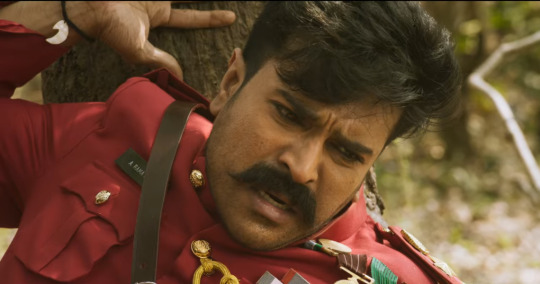
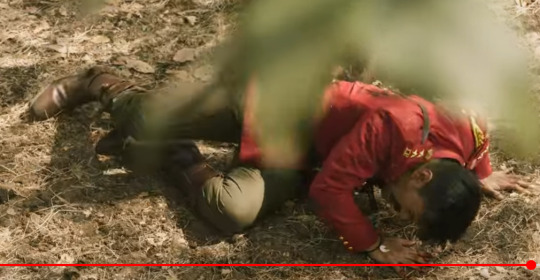
[ID: Ram when he's impaled on the tree. He throws his right hand up, and the framing ends right where his wrist does so we can see the bracelet. It is turned towards his inner arm. In the second image, he has fallen to the ground. Again, the pendant is on frame, with the pendant turned towards his outer arm and falling over his hand. End ID]
And listen, I know that I sound insane, but this is consistent. Obviously Rajamouli didn't frame every single shot with the wristband in mind, but there is a very clear pattern where the wristband is invisible when Ram is pretending to be a British officer, and visible when he's not. That's not even only after Bheem is whipped; in retrospect, they were also doing that in the first few scenes. Ram was not wearing the wristband when he was fighting that mob; he was when he was punching the punching bag, but it was hidden. Then it was shown when he was with his uncle, and even more when he was talking about killing governor Scott. When he was lying to Lacchu, it didn't appear much. Then it made a comeback when he helped Bheem save the child, and then in the Dosti montage we had a lot of attention drawn to it (not only in the obvious moment where he talks about the pendant, but also in others; for example, in the shot where they are talking and laughing, Ram's pendant is visible, despite the fact that he has his hand in his pocket).
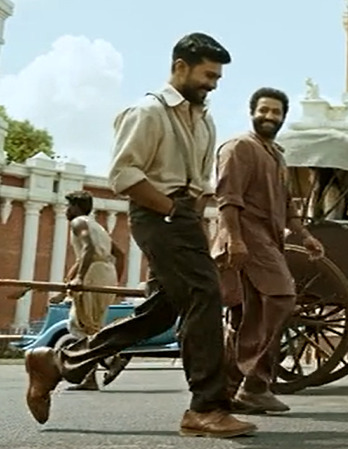
[ID: Ram and Bheem walking side by side. They are both laughing, and Ram is looking slightly down. His hands are in his pockets, but the wristband is still fully visible. End ID]
So, I think the framing matters here. If the flogging scene was drawing attention to the absence of the pendant on Ram's right wrist, these other shots are drawing attention to its presence. The more of the real Ram we see, the more of the pendant we see, again directly making the link that the wristband = Ram's humanity and true self.
Interestingly enough, it is only after he has officially saved Bheem that we get a clear closeup meant to show only the pendant again:

[ID: Ram lying on the grass after saving Bheem. He is out of focus, and his hand is extended towards the viewer. The pendant is falling over his palm, plainly visible and in focus. End ID]
If denying Bheem was denying his humanity, saving Bheem was saving it; it is back into focus, plainly visible and no longer locked away. I also find it interesting that this is when we finally get the flashback of when he gave the pendant to Seetha in the first place. At this point there's been 2h15m worth of movie and despite the fact that the pendant is very clearly referenced several times, we only get to see that moment right then. I think this implies that this is the moment when he finally connects with the part of him that's missing; it also drives extra attention to the relationship between saving Bheem and recovering that part of himself.
Not only that, but this is the first time we get a flashback that shows Ram driven by purpose, and not grief.
Ram has several flashbacks throughout the movie, but they are always of his father's death. His grief is the only thing pushing him forward. It is his grief that leads to him betraying Bheem (and I find it interesting that the pendant is also not visible in that scene, despite the fact that we get closeups of Ram's bloody right hand. I had kind of been assuming that they would show the pendant then, since it seemed to be connected to his purpose, but they don't. Now, I think that's exactly the point. The pendant is Ram's purpose, and he doesn't really have it in sight right then. He remembers the pain and the blood; he doesn't remember the ideals and hope that he had when he chose that path. He doesn't remember that this is about freedom, he only remembers that this is about a promise). It is his grief that he is thinking of when he's practicing shooting; whenever we see Ram's past, it is always focused on that one day.
The scene where he gives the pendant to Seetha is the first time we see a flashback with adult Ram. And in it we get to see Ram being tender (although he's still very serious); we get to see him talking about courage; we hear the "Vande Mataram" chant, a scream of love for the motherland rather than trauma and resentment; we get to see Ram being larger than life, motivated, focused. I mean, hell, Seetha puts a tilaka on his forehead. That is supposed to help one's focus, health, and mental stability, yes; but it's also related to the search for self awareness. Ram leaves with Seetha his humanity, and Seetha says goodbye by trying to connect Ram deeper with himself. Obviously, that doesn't last. But once again, the link that his connection with Seetha and the pendant = his connection to himself is strengthened.
And so, reliving that memory means finding that connection to himself again. It means finding his drive, his courage, his motive. It seems that, finally, Ram has remembered himself. And he achieved it through his love for Bheem, who, just like Seetha, now embodies his ability to connect to others, fight for what's right, and be himself.
I believe that this is also why, after that scene, the pendant stops being a wristband and becomes a necklace.
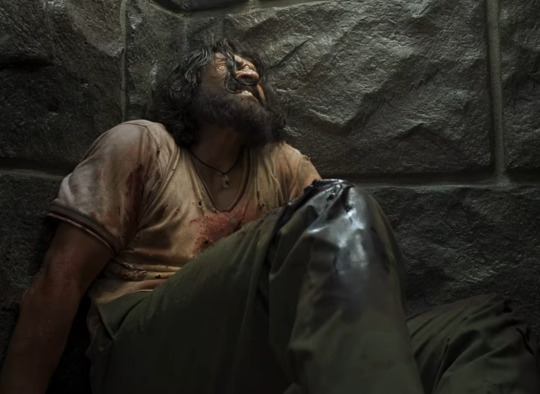
[ID: Ram in prison, groaning and throwing his head back. Due to the movement, you can see the pendant is now on a necklace. End ID]
A wristband is easier to see; it is something that you can always bring back to your line of sight. Wearing the pendant on a wristband, Ram is keeping it as a reminder; he is trying to make sure he doesn't forget who he is and what he's fighting for. We even see it serve that exact purpose during the torture scene with Lacchu. But a necklace doesn't need to be seen. Putting the pendant on a necklace means keeping it closer to his heart. At this point, Ram has internalized the pendant, and doesn't need to look at it to remember who he is; it's already a part of him. Because once he remembered who and what he's fighting for, and found again his humanity and drive, he didn't need it as a reminder anymore.
It's also worth noting that Seetha wears her own pendant as a necklace as well; when Ram puts it on the same place, it implies that their connection is stronger. As if they are no longer displaced and there is no longer the chasm between the Ram Seetha remembers and the Ram Ram sees.
Additionally, the pendant was originally a necklace before Ram broke it and gave it to Seetha:

[ID: Ram talking to Seetha before he leaves the village. He is wearing the pendant, which at this point is a full circle, as a necklace. End ID]
Then, immediately after he tears it, it becomes a wristband:

[ID: Ram spreading his arms as he gets on the boat that will leave his village. This is after he has broken the pendant, and he is no longer wearing it as a necklace; instead, we can see that he is wearing a wristband. End ID]
So, it being a necklace again also implies that he is going back to his roots, reconnecting to who he was and what he wanted when he first went on this mission.
Which is why it's extremely interesting that Bheem is the one to give Ram back the other half of the pendant. You'd expect it to be Seetha when they are reunited, but instead, Bheem takes it to him before he brings Ram back to Seetha. Which in turn reminds me of what he tells Seetha before going to rescue Ram:
"I will bring you back your Ram even if I have to lay down my life."
Again, I am going with the English translation, and I don't know what they say in the original, but I did once again check the Netflix translation and the translations in other languages that I speak/understand and they all kept the "your", except for Italian, so I am going to assume that this translation is accurate and close to the original Telugu.
This wording striked me as odd when I first watched, because why is Bheem emphasizing that Ram is Seetha's in that moment? Obviously they are engaged, so, you know, makes sense, but why is he emphasizing it? Rewatching it now, I think I get what he means: it's not just that he will bring back Ram; it's that he will bring back the Ram that Seetha knows. The real Ram. It's not enough to bring back Alluri Sitarama Raju; he is telling her that he will bring her the Ram she knows and loves, the one who's a rebel and who's whole. Which is why it makes sense that he takes Seetha's half of the pendant with him.
That is another part that first striked me as odd, because it seemed to directly contradict another thing he told her:
"Seetha shouldn't go looking for Ram. Ram should come to wherever Seetha is."
So why bring the pendant with him before reuniting Seetha and Ram? If this was simply about bringing Seetha and Ram back together, it would make no sense for Bheem to do this. Which is why I think that it's more than that; when he brings Ram back the pendant, when he puts the two halves back together with his own hands, he is making Ram whole again. Not just because he is saving him from death, but also because he is offering Ram his forgiveness and friendship again; and Ram needed that in order to move on from what he did, and find the person that he tried to bury and nearly forgot about these last 4 years.
In other words, the union of the two parts of the pendant is less about reuniting Ram and Seetha as people, and more about reuniting Ram with what Seetha represents; which, in turn, allows him to come back to Seetha as the Ram that she knew and missed.
(Of course, Ram will never go back to being exactly the same, and the pendant will always have the marks of the break; but it's rebuilding itself, and that's what matters)
And that is a natural conclusion to their relationship, because Bheem had been helping Ram find himself since the moment they met, as shown in the Dosti montage and the jarring differences between how Ram was and acted away from Bheem versus near Bheem. Not to mention Naatu Naatu, the first and only moment where Ram didn't just stand by and watch as his people were done injustice before he decided to save Bheem. The Ram that Seetha knew would never have come back to her if Bheem hadn't been there to help him find his humanity again. Which is why Bheem is the one to put the pendant together, and also why he is the one to put Ram's hand in Seetha's when they reunite; because without Bheem, Ram wouldn't have found his way back to her, because he wouldn't have found himself again.
I also think this is one of the reasons Bheem also puts a tilaka on Ram's forehead; of course, there is the fact that he is giving Ram the getup that he is known for, but remembering how Seetha had once put a tilaka on Ram's forehead, I think the fact that Bheem does it the second time also reinforces the connection between his relationship with Bheem and his relationship with Seetha, as well as the idea that he is reconnecting Ram with himself, just like Seetha tried to do when they were first parted.
Bringing Ram and Seetha together meant reconnecting Ram with his true self, and because Bheem was the one who reminded him who he was and what he was fighting for, he needed to be the one to do it.
#rrr#rrr 2022#alluri sitarama raju#komaram bheem#rise roar revolt#bheem#raju rrr#rambheem#ramseetha#meta#rrr meta
55 notes
·
View notes
Note
Hey, bheem :)
I just reached the outskirts...where do you want me to come meet you?-
~ @maakhan-addict
Maybe you should come to the tree yk :) and meet me and my friends... Or maybe even my home? I'm free today
8 notes
·
View notes
Note
Can you write something with Vrishasena and Arjuna? Arjuna would have been such a good uncle and all of them would have been such a cute family.
Hello there anon! You're right on time, I wrote this in the return train ride lol.
About Arjuna being an uncle to Vrishsena, I'm not sure if you're asking for a canon-divergence? Let me know if you have a specific scenario in mind. But, for now, here is a canonical one:
3 times Vrishasena found his Uncle, +1 time it was otherwise.
1.
Indraprashtha's Palace of Illusions is larger than the one in Anga, and infinitely more complicated than the one in Hastinapura. Vrishasena is, simply put, quite lost. His father's is in Uncle Duryodhana's retinue and far too busy smoothening the Prince's ruffled feathers to pay him any mind. The other Kings are not people he has been introduced to, and he's pretty sure approaching them for such a trifle would start a war. That left the Pandavas.
Vrishasena stops at the huge double-doors leading to the garden. Made of mahogany wood, they are twice as broad as he is tall, and eight times as high. He studies the carvings on them while he contemplates his options. Yudhisthir he refuses to ask for help - the Emperor-to-be referenced etiquette and scriptures eleven times in the six minutes he has known the man. Crown Prince Bheem is out of question, for obvious reasons. The twins are a good choice, but he doesn't know where they are. That leaves Prince Arjun, who is strolling in the garden with the King of Dwarka.
Vrishasena gives the guards a dubious look, then makes his way towards his target. Krishna notices him at once, and a beatific smile brightens up his face. He spreads his arms wide and turns towards Arjun. "Look, my friend. The Prince of Anga is here."
Arjun notices him and offers him a polite tilt of his head. "Namaste. How may I help you today?"
Vrishasena bows. "Namaste, I was looking for Prince Abhimanyu."
Arjun's face goes from courteously disinterested to downright suspicious in less than a second. "Why?" he asks, far too curtly in Vrishasena's estimation.
Krishna throws back his head and laughs. "These are two young boys in a bunch of nagging kings engaged in politics. What did you think would happen, Parth?"
Arjun flushes. Vrishasena hurries him along. "We're acquainted, Prince. He was gracious enough to offer to show me around."
"Oh," Arjun mumbles. "Try out the kitchens, he's always trying to charm an extra sweet out of the cook."
Vrishasena bows again. "I thank you. Have a good day."
He is quietly backing away when he hears Arjun's stiff reply. "You too. I hope you like Indraprashtha enough to visit again."
2.
Hastinapura's Palace is a veritable playground for his brothers and the Kaurava children. Vrishasena, as the eldest of them all, has been saddled with the unenviable responsibility of minding them today. This, naturally, involves a great deal of screaming and shouting on his part, and a much greater indifference on the part of the children.
"Do not run in the corridors!" he yells after Lakshmanaa, who gathers up her skirts and runs faster. "They have been wiped. You're going to slip! Lakshmanaa!"
Lakshmanaa lets out a shrill shriek as he comes dangerously close to snatching her hand and turns around the corner. Vrishasena's only warning is a muffled "oof!" before he skids around the corner himself, and barrels straight into someone.
They collapse in a heap - him dazed, Lakshmanaa laughing and the man grunting out in pain.
"Oi, you!" says a feminine voice. Vrishasena looks up. A beautiful woman looms over them, dusky face cut through with a bright, toothy smile, eyes sparkling like diamonds. "Please free my husband," she requests, shoulders shaking with laughter. "Warrior though he may be, I fear he will not live long like this."
"Empress Draupadi," he manages, then scrambles over to see which of Kunti's scions he has had the misfortune of knocking over. Of course, because the universe hates him, it is his father's mortal enemy.
"Prince Arjun," he greets, somewhat stupidly, then drags a still-giggling Lakshmanaa off him. "Are you hurt?"
Arjun rubs his forehead. "Apart from my pride? No, I don't think so."
"We're sorry," Lakshmanaa offers, not sounding apologetic at all. "Brother Vrishasena is having a hard day."
"I wasn't the one who knocked him over," he protests, half tempted to wring his hands in frustration.
"You did fall over, though," Draupadi points out, then starts laughing again.
"Where are you going?" Lakshmanaa asks, not even portending to be subtle about changing the subject.
"Your father invited us to a Dyut Sabha," Prince Arjun says, just eager to move on. Humiliation is not a good look on him.
"I hope you enjoy your game," Vrishasena offers, then bows. "Come, Lakshmanaa, let's go."
"Listen, Vrishasena," Arjun calls after them. Vrishsena waves the little Princess away. "Don't tell Angaraaj this happened."
"Lakshmanaa will tell Unc- er- Prince Duryodhana."
Arjun sighs. "Duryodhana has seen lots of embarrassing situations first hand. One more is no gain for him."
"Okay," Vrishasena shrugs. "I won't lie to him if he asks, but I won't tell him on my own either."
Draupadi gives them both a bemused look, but Arjuna nods. "Thank you. That is all I ask."
3.
It has been many years since Vrishasena saw Arjun. The Pandava Prince looks different now. His gaunt face is shielded by a scraggly beard, his hair is tangled and haggard. The finery he once bore with ease now hangs loose from his lean frame. The war and Abhimanyu's death have worn him down, perhaps more than it has worn down Vrishasena.
It is not easy to keep pace with Arjun - fabled archer that he is. But Vrishasena is Karna's son, blessed thrice by love of his parents, of the Kuru clan, and the love of his people. Ten times he pierces Kunti's youngest child, ten times more he goes after Dwarka's King. He fights even as his father and the Kauravas draw close, and Arjun taunts them with the inevitability of his demise.
The sight of him makes Vrishasena stop heckling Bheem. His charioteer tries to steer them after Bheem, but Krishna cuts through their path and draws up in front of them. In the distance, he sees the white conch of his father's flag flutter ever closer. Arjun lifts up his bow in challenge, and Vrishasena thinks quietly to himself, Death has come for me.
He does not have the breath to speak, but he thinks of his father and pleads fervently, Let me fight, let me go, and Karna, whether he hears it or not, stays away. Arjun's arrows take off his arms one after the other, and then take off his head. Vrishasena does not have the time to feel anything but relief.
+1.
Sometimes, Arjun thinks, it is better to be ignorant and live in bliss.
Yudhisthir sits slumped on the ground, head buried in his hands. Draupadi is quiet, eyes turned heavenwards in a blank stare. His other brothers are gathered around, gaping at their mother. Even Krishna is silent and still.
"I want to go home," Sahadev says suddenly, sounding like the little boy he was all those years ago when they made their laborious way from Shatashringa to Hastinapura. The words make Arjun's heart ache.
"We will be going home right after," Kunti soothes, placing a hand on his arm. He had ever been her favourite child.
Now, Sahadeva throws off her hand and turns away. "No!" he shouts, choking on a sob. "I will not go to that graveyard. I want to go home!"
Yudhisthir lets out a strange sound, somewhere between a hiccup and a cough. Arjun looks towards the burning pyres. Karna he cannot mourn - their history is longer than Vishnu's endless serpent and deeper than the waters of the ocean. But he thinks of Vrishasena, Karna's son and his nephew, sprawled on the ground - without arms or a head, and his stomach turns. He thinks of Karna killing Abhimanyu and can feel nothing but rage. He thinks of Vrishasena coming after Nakul, and feels his heart leaden with sorrow.
Somewhere among the burning pyres Vrishasena's body smoulders. Arjun dares not go search for him.
"I'm sorry," he tells the bitter winter air. He watches the words mist in front of his face, watches the mist float heavenwards, mingling with the smoke from the pyres. He thinks of himself weeping over Abhimanyu's mangled remains, thinks of Karna stoically arranging Vrishasena's severed parts for his last rites. He thinks of devoted friends and silent mothers and cursed thrones, and apologizes no more.
#mahabharat#mahabharata#hindu mythology#karna#vrishasena#arjun#arjuna#abhimanyu#lakshmanaa#draupadi#krishna#kunti#yudhisthira#sahadeva#anon asks#anon ask#anon reply#anonymous#askbox#ask#anon answered#answered#3+1#fics#3+1 fics#boo writes
35 notes
·
View notes
Note
I made an au! Alr? Here:
Arjuni was the youngest princess of Hastinapur. She was the loveliest, yet the quietest. She had many names, which she obtained through hard work and talents.
Arjuni was loved by everyone, except for her own mother, the Raaj Maata of Hastinapur and Gandhar Raj. Kunti never loved her daughter, always looking down upon her and abusing her. Kunti blamed Arjuni for anything and everything, be it her fault or not. In her eyes, her daughter was the biggest mistake she ever made.
Arjuni was the age of sixteen now. She was the youngest to go to Dronacharya's hermitage to learn. Her other younger cousins and her two younger brothers were receiving training in the palace itself. The Kauravas, the so called enemies of the Pandavas, never hated on her. They always brought her flowers, toys, clothes, jewelleries and trinkets whenever she was present in the palace Arjuni was Duryodhan's favourite, always carrying his little sister on his back whenever he could and would run through the whole palace, enjoying her squeals of joy.
Believe it or not, her life was never the easiest till her mid-teens. In fact, it was the hardest. The Tritiyaa Pandava always had scars and bruises on her body due to her mother. And the Kauravas didn't like the Pandavas only because they were not able to protect their own sister.
As for Gandhar Raj, he never liked the Rajkumari as she was the bridge linking the Kauravas and Pandavas, becoming nothing but the sharpest thorn in his way. He had went as far to poison the girl's food and always faulting with the chandeliers and many other 'accidents' who knows how many times. He didn't know that the girl was immune to poison, so when his plan didn't work he added more poisonous content the next time.
But he was discovered later by Bheem and Duryodhan, who were finally getting along. The two boys were walking together and talking about maces and food when thev discovered Shakuni walking suspiciously with a vile in his hand, partially visible under his robes.
Duryodhan, suspicious of his maternal uncle, whispered to Bheem to follow Shakuni quietly, and when they did, they saw him putting the contents of the vile, a sickly poisonous green in colour, into Arjuni's food. They both, horrified at Gandhar Raj's intentions, entered the room quietly, and Bheem grabbed his arms behind his back. The deceitful gambler was startled. He eldest nephew walked in front of him with the scariest glare he had ever seen.
"I-it is not what it looks it, mere bachche!"
Shakuni tried to free himself but he was shorter and weaker than the VayuPutra so it was of no use. "Oh, I know perfectly, Mamashree. Bhrata Bheem, drag him to the Sabha!" Bheem nodded and nearly broke Shakuni's arms as he dragged that worthless piece of flesh and bones into the Sabha and threw him in front of everyone.
Gasps were heard. Shakuni tried to say something but Duryodhan shouted first. "Pitamah! Pitashree! Gandhar Raj here tried to poison Arjuni's food! Both me and Bhrata Bheem were eye witnesses!"
"T-that is not true, Maharaj!" Shakuni protested.
"It IS true, Pitamah! And if both me and Duryodhan, who were previously enemies, say something of the same incident, we definitely could not have planned it beforehand. I even have the vile, and this seems like poison from Gandhar."
Gandhari was called down from the balcony to inspect the said vile, and Shakuni tensed. The Maharani gasped. "It is...a poison from Gandhar..." She could not believe her brother. How could he!?
Shakuni tried ask help from his sister but she denied, and instead said. "I am disappointed to have you as my brother! How could you? What has that young girl ever done to you! Go rot in hell! It was you who faulted with the chandeliers and everything in her room, weren't you?"
Shakuni said nothing but looked down, giving the answer unintentionally.
All the Pandava and Kaurava brothers would have pounced on that lying piece of shit right then and there had it not for being Arjuni. She had to literally hold them back.
With Bheeshma's orders, Arjuni stayed behind his figure as the cousins tortured Shakuni to death, at last Duryodhan beheading him. And guess what, Kunti blamed Arjuni for his death for who knows what reason, when the one at fault was Shakuni himself.
Finally, one day, she had had enough with the abuse. As Kunti was shouting and screaming as usual, she said something which shocked everyone. "I hope you die or leave from here and never come back!" Dhritarashtra tried to say something in defense of his niece, but Arjuni had only smiled sadly. "Well, your wish is going to become true today, Mother. I do hope you all have a very good life ahead." Dushyala tried to stop her younger cousin. "Behena! Wait!-" but Arjuni had already left from there, her long hair dancing in it's own rythm and flowing in the wind. Dronacharya's best student could have argued or gone against her mother's abuse but she left...she left with only a sad smile....
The Kauravas started to hate their aunt because of her incompetence and her being. The Pandavas also didn't talk much with her, as they lost their beloved person...again.
The palace was less lively, as if all of the life had been sucked out of the Kuruvansh. Everything became gloomy.
But meanwhile, Arjuni was living calmly in a beautiful hut she had built on her own, pleased finally that she wouldn't have to live in argumentative environments for now. She lived happily here, with simple lehengas or sarees, jewelleries and anklets, dhotis and cholis, the plants and trees, the rivers and waterfalls, and the birds and animals, which seemed to love her a lot. She lived in a lovely, and the calmest part of the Khandavavan. Though she still practiced her fighting skills and archery, Arjuni would dance and roam in the forest collecting flowers. That was practically her routine as she had nothing to do.
Arjuni was not alone. She had taken her horse Vikram with her here. They were best friends, and were always together, be it the peaceful times or the times of battles and wars.
One day, when Gudhakeshaa was collecting water at night, she heard flute sounds, and felt a pull along with those melodious tunes. She held her pot beside her waist and let the imaginary pull take her to somewhere she didn't know. As Arjuni continued following the magnetic force, she saw a boy, maybe a year older than her, sitting on a tree, a golden flute in his beautiful hands and adorned near his pink lips, yellow robes and a peacock feather adorned in his shoulder-length curls. He was dusky complexioned, just like her.
Should i continue?
OMGGGGG
MAKE THIS A SERIES THIS INSTANT
DO IT I LOVE IT
9 notes
·
View notes